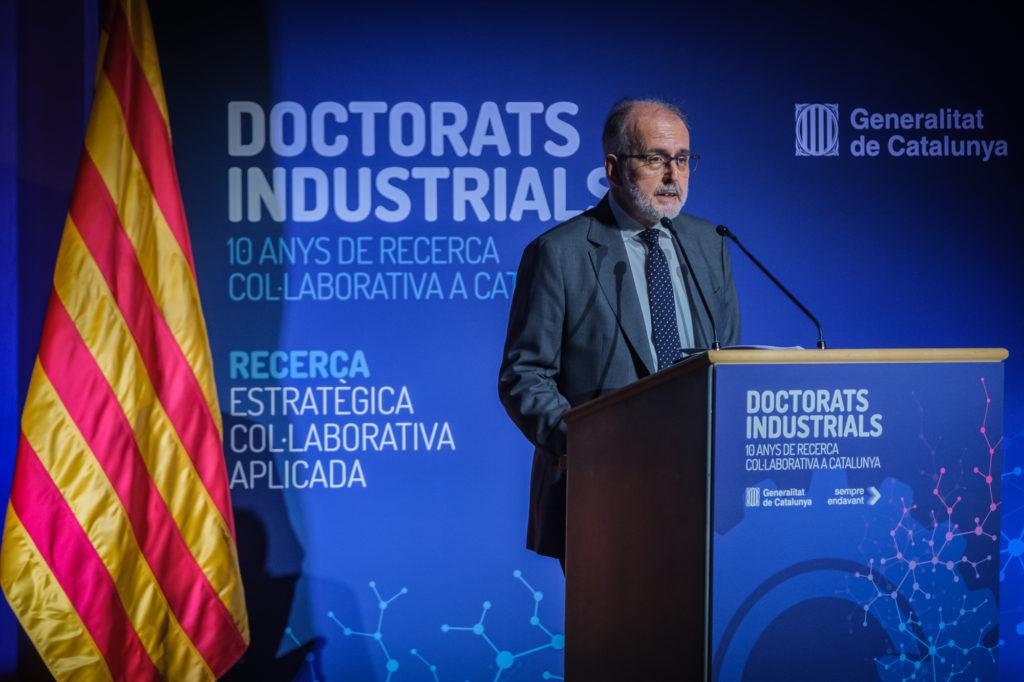
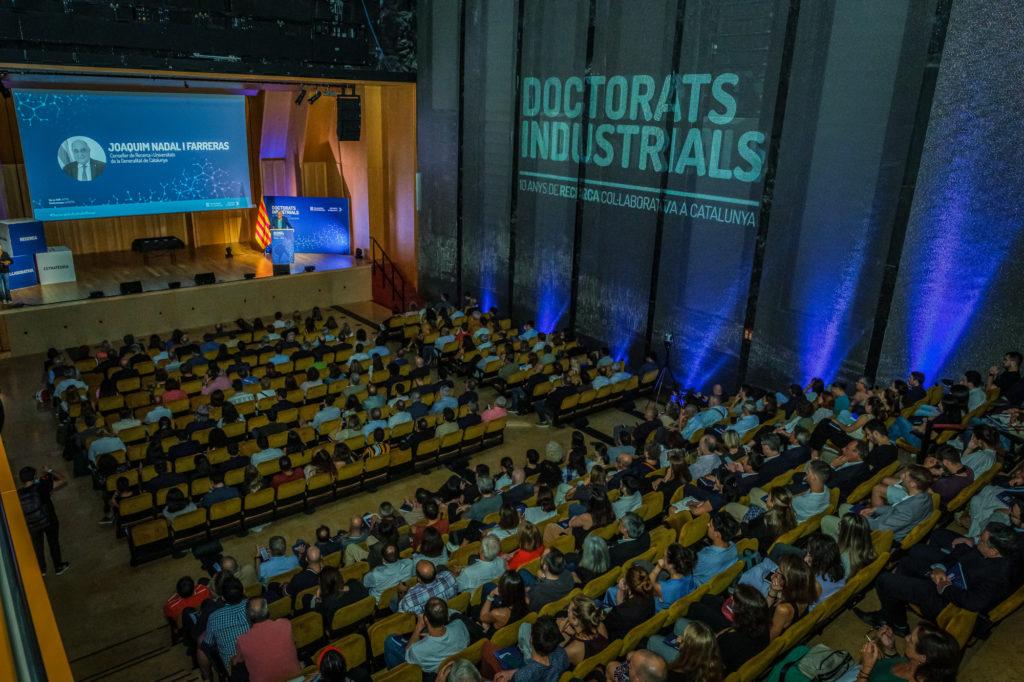
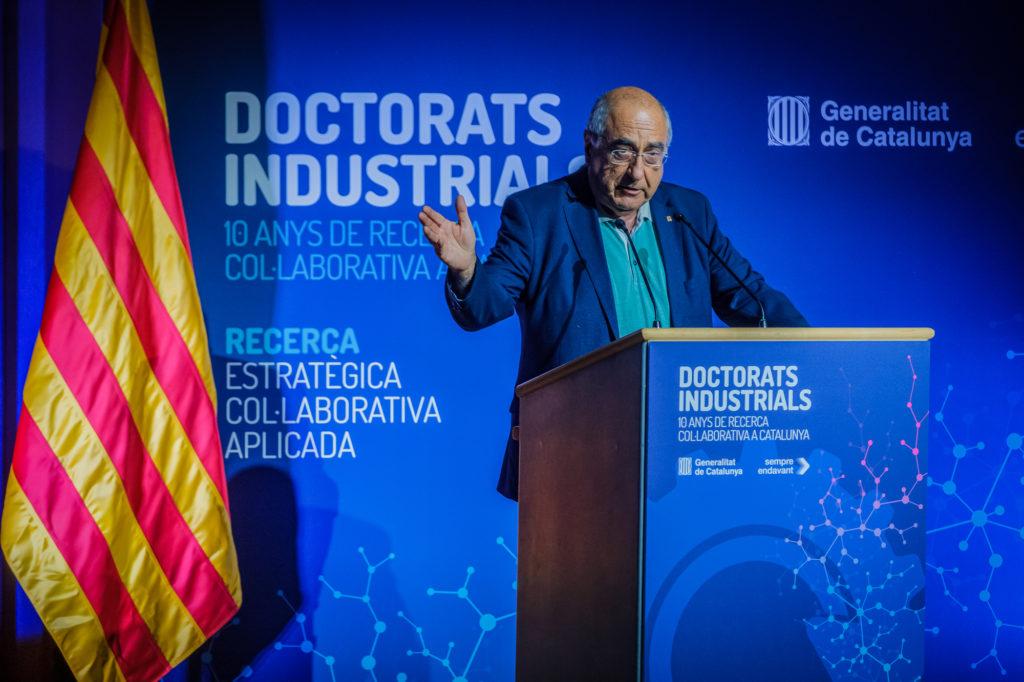
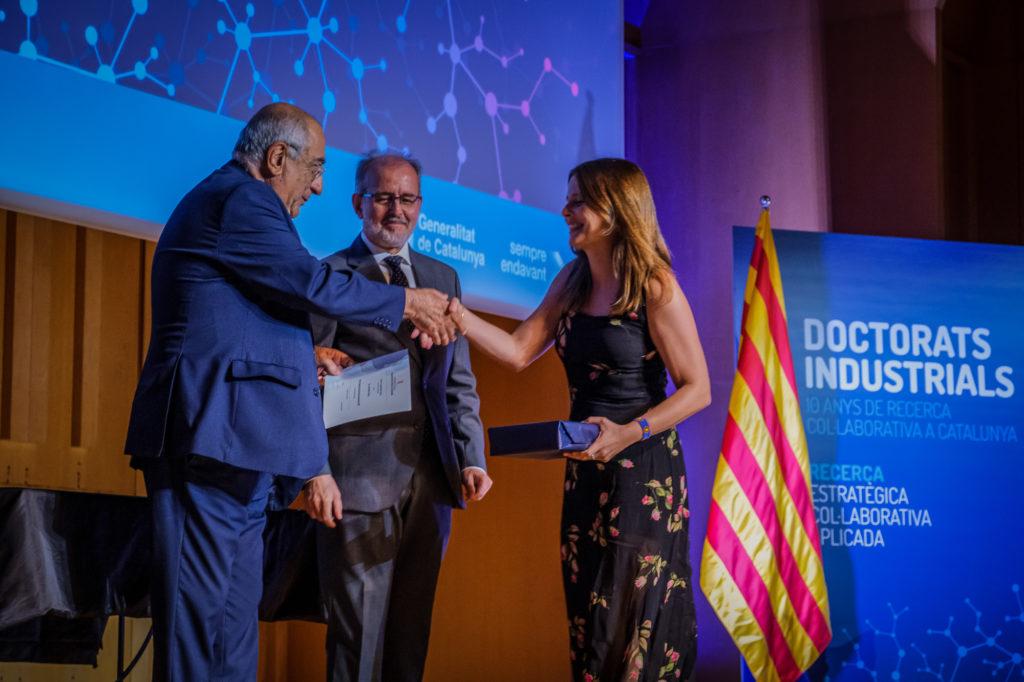
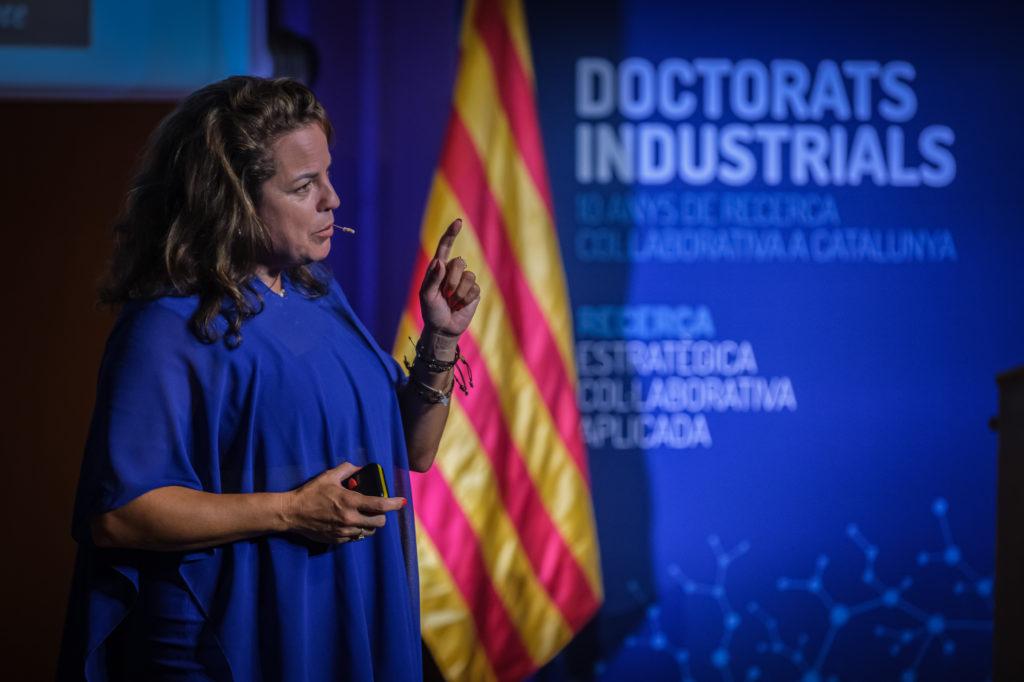
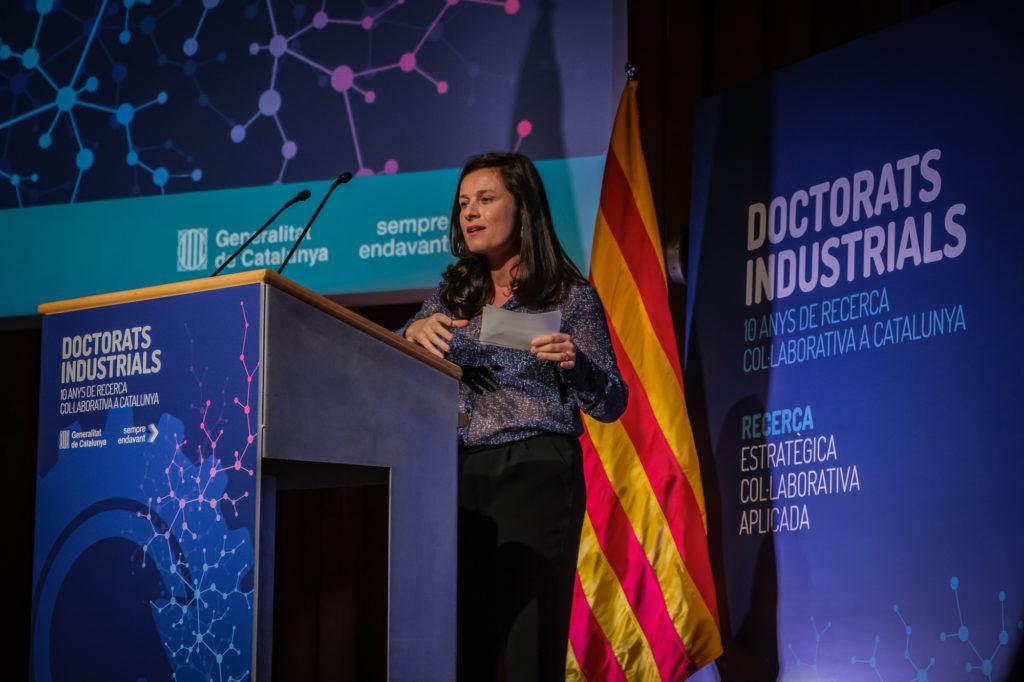
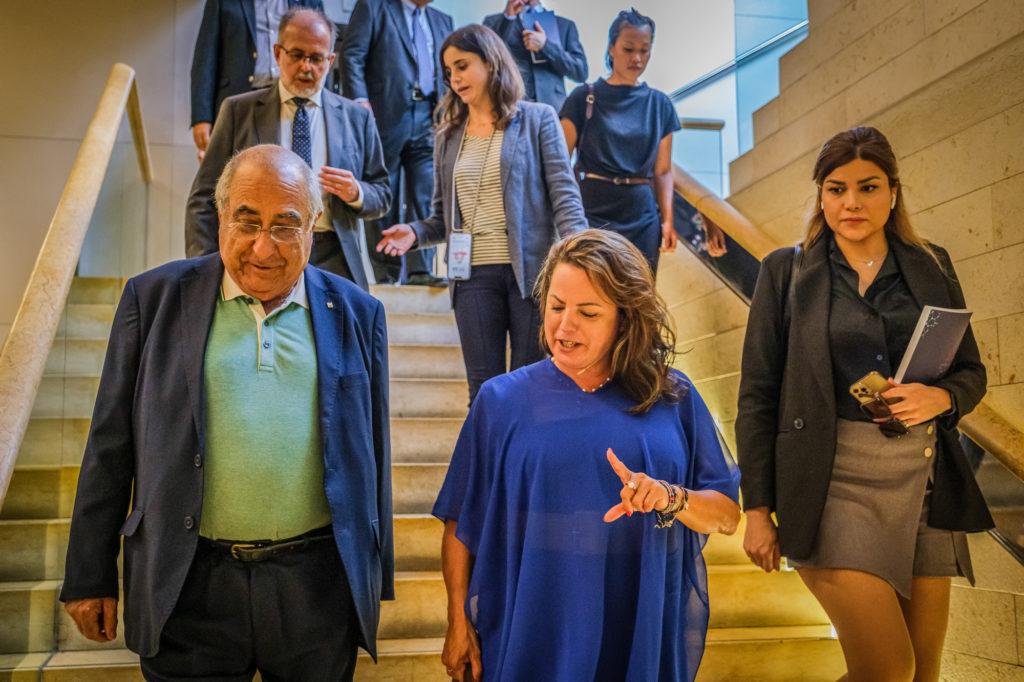
The Industrial Doctorates Plan (ID) of the Department of Research and Universities has made it possible to complete a total of 918 applied research projects in its first ten years in operation. A decade of experience of the program to promote technology and knowledge transfer in Catalonia in which 671 researchers from the Catalan system of universities and research, 600 companies, 12 Catalan universities and up to 30 research centers in the country have taken part.
Between 2012 and 2022, public-private funding for the plan amounted to 120 million euros, two thirds from the private sector and one third from the public sector, and the call for IRs has increased by 1.5 million to 6 million per year.
The Minister for Research and Universities, Joaquim Nadal i Farreras, who presided over the commemoration of the 10th anniversary of the ID Plan held this afternoon at the Palau de la Música, reaffirmed "the Government's commitment to the continuity of the Industrial Doctorates programme, so that it increases resources and continues to deepen close collaboration between the university and research centres with companies".
Minister Nadal also put the ID Plan as an "example of the objective that gives meaning to the work of the Government to work to build a better future for Catalonia, with citizens at the center of its policies, hoping that it becomes not an exception but rather a rule of joint work between the public sector and the economic and social fabric".
For his part, the academic director of the ID Plan, Albert Sangrà, pointed out that "industrial doctors act as bridges of knowledge transfer, contributing to strengthen relations between the industrial fabric of Catalonia and universities and research centers".
Collaborative research between university and business
IRs are a programme promoted by the Department of Research and Universities with the aim of responding to the challenge of knowledge and technology transfer and its application in the country's productive fabric. Over a decade of experience, the Plan has consolidated a collaborative research model that has made it possible to enhance knowledge, incorporate and retain scientific talent, enhance the competitiveness of the productive fabric and generate highly qualified jobs in the country's productive fabric.
These projects have allowed doctoral students to acquire scientific skills at the highest level, as well as access to first-class equipment and infrastructure. Companies, for their part, have attracted talent and have contributed to training people with great potential to improve competitiveness and internationalization, as well as boost their performance and advance technologically. The knowledge generated in universities, research centers and hospitals, but also in companies and institutions, has allowed to create bridges of collaboration between the academic world and the socioeconomic world.
By field of research of the projects, the main areas have been information and communication technologies (26%), health and biomedical sciences (22%), chemical sciences and technologies (15%), and social sciences (11%). The rest of the projects have been included in the fields of design and industrial production (8%); civil, geoenvironmental and architectural engineering (6%); mathematics and physics (6%); biology (5%), and arts and humanities (1%).
In the history of 10 years and more than 900 doctoral projects, the ID Plan has encouraged transfer between the university and research system and the productive fabric in a wide range of fields of knowledge. Within the framework of the Plan, collaborative research projects have been carried out on vehicle electrification, communications security, e-mobility, 5G technology, agri-food and sustainability, as well as disruptive projects on 3D food printing, CO₂ capture, circular economy, Machine and Deep Learning, artificial intelligence, plant proteins or increasing the capacities of disabled people.
A consolidated model
The research model deployed by the Industrial Doctorates Plan is based on research projects that connect universities, research centres, companies and institutions. The predoctoral researchers develop the collaborative research project, which will be the object of their doctoral thesis, as contracted personnel of the companies, with a minimum remuneration of 22,000 euros per year, which facilitates their continuity, once the project and the doctoral thesis are finished.
In addition, the program seeks to promote collaborative effort in research teams, culminating in results that, on the one hand, are applied directly to the companies involved and, on the other, generate economic activity in the territory and transfer technology and knowledge with an impact on society as a whole.
The professional projection of graduates with doctoral degrees, in addition, shows a clear tendency to consolidate in our country. According to the results of the latest Survey on labour insertion of graduates in Catalan universities coordinated by the Agency for the Quality of the University System of Catalonia (AQU Catalunya), doctoral students show data bordering on full employment, with only a 1.7% unemployment rate. The company already employs more than half of recent doctors (55% of the total, compared to 28% of universities and 17% of research institutions) and the growth of these graduates has grown within the private sector up to 16% since 2008.
IRs are an initiative of the Government of Catalonia initiated as a pilot plan in 2012 and aligned with the National Pact for the Knowledge Society (PN@SC). It is based on other successful international experiences, with more than 30 years of experience, launched in countries such as France or Denmark, and has an annual call, permanently open, which resolves the selected candidacies four times a year.
Commemoration
The Industrial Doctorates Plan has commemorated its 10th anniversary with different actions that culminated in the event held today at the Palau de la Música. Within its framework, the 2012-2022 DI Impact Awards were presented, which recognized four projects in the categories of Impact on society (Linh Johansson, industrial doctoral student between the Polytechnic University of Catalonia (UPC) and Mimetis Biomaterials S.L; Impact on people (Joel Torres Serra, industrial doctor between the UPC and TMI Técnicas Mecánicas Ilerdense SA); New proposal for an industrial doctorate project (Mahsa Pourmohammad Golloujeh), and Impact on business [Dra. Laia Bosch Camós, industrial doctor between the Autonomous University of Barcelona (UAB) and the Institute of Agrifood Research and Technology (IRTA)].
The event was also attended by professionals of international scientific relevance and a keynote speech by the international expert in innovation and advisor to the administration of Barack Obama between 2010 and 2017, Natalia Olson-Urtecho.
The compilation book Industrial Doctorates. 10 years of collaborative research in Catalonia reviews the decade of experiences of the ID Plan, through different perspectives and contributions from collaborators.
In addition to different actions on social networks, a video has also been produced to collect different testimonies of participants of the ID Plan and various collaborations, as well as the results and impacts of the projects.

